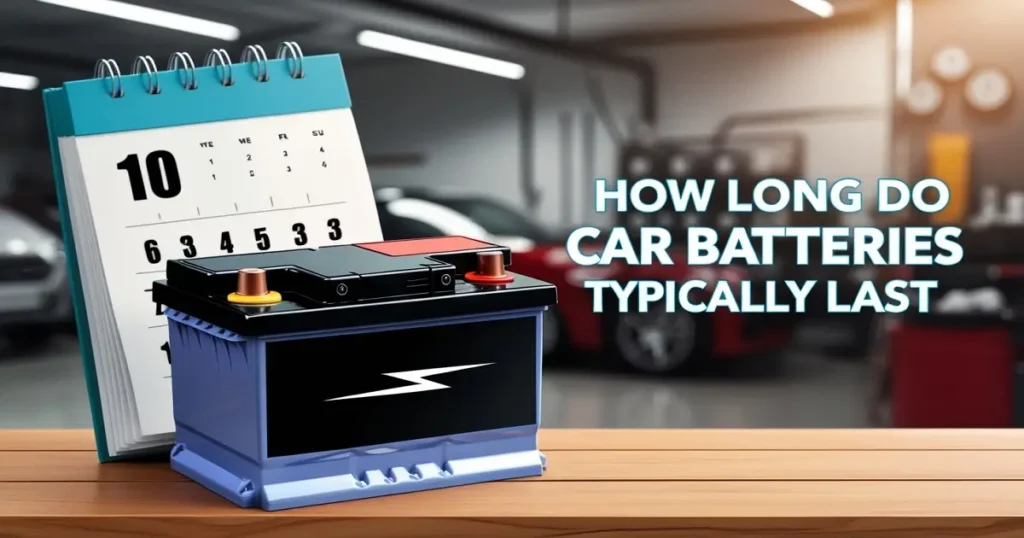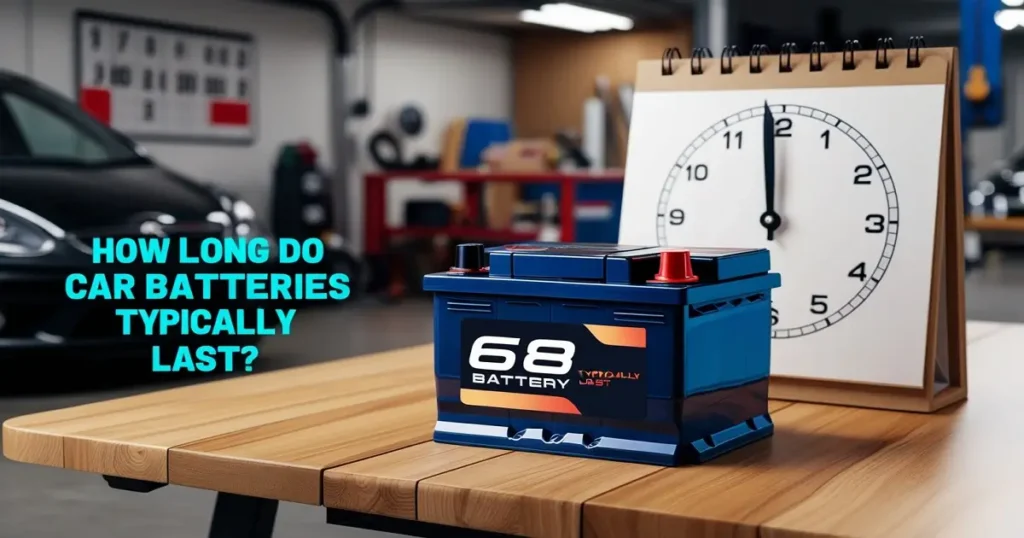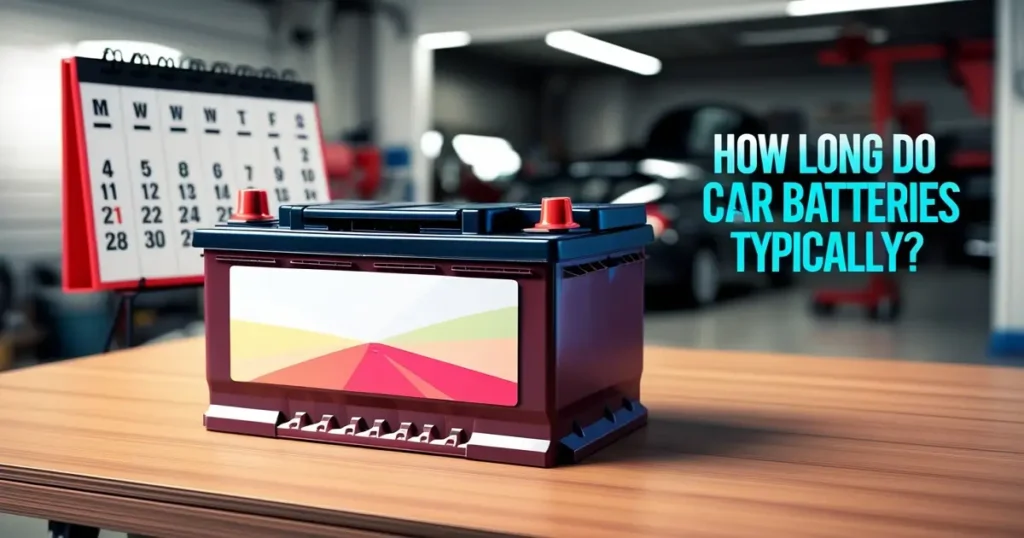Introduction
Imagine this: you’re running late for work, you hop in your car, turn the key, and… click, click, click. Nothing. That dreaded sound is a universal sign of a dead car battery. It’s a hassle nobody wants to deal with! But what if you could see it coming? Understanding how long do car batteries typically last is your first line of defense against being stranded. It’s not just about avoiding a bad morning; it’s about saving money, keeping your car reliable, and driving with confidence. Think of this guide as your car battery’s best friend. We’re going to break down everything you need to know in simple, easy-to-understand language. No confusing jargon, just clear facts and helpful tips. Let’s dive in and make sure your next start is a strong one!
Table of Contents
What is a Car Battery? (And Why is it So Important?)
Think of your car’s battery as its heart. Just like your heart pumps blood to give your body energy, the battery sends a powerful jolt of electricity to start your engine. Once the car is running, the alternator takes over to power everything and recharge the battery. But that initial “heartbeat” is everything! It’s a small box filled with a special acid and metal plates that create a chemical reaction to store power. Without a healthy battery, your car is just a very heavy metal sculpture. Ever wonder why your headlights dim if you sit in a parking lot with the radio on for too long? That’s your battery begging for a recharge! It’s a hard-working little hero that deserves a little attention.

Why You’ll Love Understanding Your Car Battery
Knowing about your car’s battery isn’t just for mechanics. It’s for every driver who wants to be smart and prepared.
- Save Money: Replacing a battery before it dies completely often means you can shop for the best price instead of being forced to pay whatever the tow truck driver or the only open shop charges. You avoid expensive emergency service calls.
- Save Time and Stress: Avoiding a surprise failure means you avoid the massive hassle of being late, waiting for a jumpstart, or arranging a tow. That peace of mind is priceless.
- Keep Your Car Reliable: A good battery doesn’t just start your car. It provides stable power for all your car’s computers and fancy features, from your navigation system to your safety sensors. A weak battery can cause weird electrical glitches!
- It’s Easier Than You Think: Checking on your battery is simple. Learning a few basic signs and maintenance tips can make you feel like a car expert and keep you in control.
Understanding the answer to how long do car batteries typically last empowers you to be a proactive driver, not a reactive one.
How Long Do Car Batteries Typically Last? The Quick Overview
So, let’s get to the big question: how long do car batteries typically last? The short and simple answer is that the average car battery lifespan is between 3 to 5 years. However, this is just a general rule of thumb. Think of it like a lifespan for a pet—some breeds live longer than others based on how they’re cared for. A battery’s life isn’t set in stone. It can be shorter or longer based on several key factors, which we’ll explore next. The most important takeaway is that if your battery is hitting the 3-year mark, it’s time to start paying closer attention to its health. By the 4-year mark, you should definitely be testing it regularly and preparing for a replacement soon. Don’t wait for it to fail!

Key Factors That Affect Your Battery’s Lifespan
Why does one battery last 7 years and another die after 2? It all comes down to a few important things. Knowing these factors helps you understand your own battery’s situation.
- Climate and Weather: This is a HUGE factor. Extreme heat is a battery’s worst enemy. It causes the fluid inside the battery to evaporate, which damages its internal structure. If you live in a very hot climate, expect a shorter battery life. On the flip side, extreme cold doesn’t kill batteries, but it makes it much harder for an already weak battery to provide the massive power needed to start a cold engine. Cold weather is often the final straw that reveals a battery was already on its way out.
- Your Driving Habits: Short trips are terrible for your battery. Starting the car uses a lot of power, and you need to drive for a while (usually at least 15-20 minutes) for the alternator to fully recharge it. If you only take 5-minute trips to the store, your battery is constantly being drained and never fully recharged. This is called “undercharging” and it significantly shortens battery life.
- Vehicle Type and Electrical Demand: Modern cars are packed with electronics—big infotainment screens, numerous safety sensors (like collision warning systems), powerful sound systems, and more. All these features place a higher demand on the battery, even when the car is off (a small amount of power is used to keep computer memory alive). This can lead to a shorter lifespan compared to an older, simpler car.
- Battery Quality and Type: Not all batteries are created equal! There are different grades—good, better, and best. A cheaper battery might save you money upfront but could die much sooner. There are also different technologies, like Absorbent Glass Mat (AGM) batteries, which are better for cars with auto start-stop systems and typically last longer than traditional flooded batteries.
- Maintenance: While many modern car batteries are “maintenance-free,” some older types require you to occasionally check and top off the water levels. Also, keeping the battery itself clean from corrosion (that white, ashy gunk on the terminals) is crucial for good connection and longevity.
Step-by-Step: How to Check Your Car Battery’s Health
You don’t need to be a mechanic to keep an eye on your battery. Here’s a simple guide to checking up on it.
1. The Visual Inspection (Do this first!):
- Pop the hood and locate the battery. It’s usually a rectangular box with two cables (one red, one black) attached to it.
- Look for Corrosion: Check the metal terminals (the knobs where the cables connect). If you see a white, blue, or greenish crusty substance, that’s corrosion. It prevents a good connection and can drain power. (We’ll cover how to clean this later).
- Check for Bulges or Cracks: Look at the battery case itself. If you see any swelling, bulging, or cracks, it’s a sign the battery is failing and needs to be replaced immediately.
- Make sure the connections are tight. Gently try to wiggle the battery cables. They should not move. If they are loose, that can cause starting problems.
2. The Headlight Test (A simple home test):
- Turn on your car’s headlights (without the engine running).
- Watch the brightness of the lights for a minute.
- Now, start the engine.
- What to look for: If the headlights get noticeably brighter when the engine starts, it’s a sign that your battery was struggling to power them on its own. This often indicates a weak battery.
3. The Professional Test (The best method):
- For the most accurate reading, take your car to a local auto parts store. Most stores like AutoZone, O’Reilly, or Advance Auto Parts will test your battery and alternator for FREE. They use a special electronic tester that puts a “load” on the battery and gives a precise reading of its health and voltage. This is the best way to know for sure.
What to Pair Your Car Battery Knowledge With
Knowing about your battery is powerful, but pairing that knowledge with the right tools makes you unstoppable.
- A Good Battery Charger/Maintainer: If you don’t drive your car often or only take short trips, a “trickle charger” or “battery maintainer” is a fantastic investment. You plug it into a wall outlet and connect it to your battery. It will slowly keep your battery charged to 100%,
preventing it from dying from lack of use. This is a must-have for seasonal vehicles like classic cars, motorcycles, or boats. - A Portable Jump Starter: This is a modern lifesaver. These are compact lithium-ion battery packs that come with jumper cables. You can keep it in your glove box. If your battery dies, you don’t need to find another car to get a jumpstart. You can do it yourself in minutes. Everyone should have one of these!
- A Multimeter: For the slightly more adventurous, a cheap digital multimeter lets you check your battery’s voltage yourself. A reading of 12.6 volts or above when the car is off means a full charge. Anything below 12.4 volts means it’s time to recharge or investigate.

Top Tips for Making Your Car Battery Last Longer
You can’t control the weather, but you can definitely help your battery live its longest, best life. Follow these expert tips.
- Drive It Regularly and for Long Enough: As we learned, short trips are a killer. Make sure to regularly take your car for a good 20-30 minute drive on a highway or open road to allow the alternator to fully recharge the battery.
- Keep It Tight and Clean: Regularly check that the battery hold-down clamp is secure. A battery that vibrates and shakes can be damaged internally. Also, clean any corrosion off the terminals as soon as you see it. (A mix of baking soda and water and a wire brush does the trick!).
- Avoid “Parasitic Drain”: This is when something electrical keeps drawing power after you turn the car off. Make sure all interior lights, trunk lights, and the glove box light turn off when the doors are closed. Don’t leave phone chargers or other gadgets plugged in for days if the car is just sitting.
- Protect It From Extreme Temperatures: If you live in a very hot area, try to park in a garage or in the shade. In brutal cold, if you don’t have a garage, a battery blanket (an electric heater that wraps around the battery) can help make winter mornings easier on it.
- Test It Seasonally: Get into the habit of having your battery professionally tested twice a year—once before summer and once before winter. This way, you’ll never be caught off guard by a seasonal extreme.
How to Stay Updated with Car Battery Tech and Tips
The world of cars is always changing, and battery technology is no exception! Here’s how to stay in the know.
- Subscribe to Automotive YouTube Channels: Channels like ChrisFix, Scotty Kilmer, and Engineering Explained offer fantastic, easy-to-understand videos on car maintenance, including battery care, testing, and replacement.
- Follow Car Care Blogs: Websites like YourMechanic, Car and Driver, and J.D. Power regularly publish articles and buyer’s guides on car parts, including the latest and greatest in battery technology.
- Join Online Forums: If you have a specific car model, there’s almost certainly an online forum or Facebook group dedicated to it. These are goldmines of information where owners share their experiences with which batteries last longest for their specific vehicle.
- Talk to Your Mechanic: Don’t be shy! The next time you’re in for an oil change, ask the technician to take a quick look at your battery and give you their opinion on its health. A quick visual inspection from a pro takes seconds and can give you great insight.
Conclusion
So, how long do car batteries typically last? We’ve learned it’s usually 3 to 5 years, but it truly depends on you, your driving habits, and your environment. Your car’s battery is a vital component, but it doesn’t have to be a mysterious one. By understanding the factors that wear it out, knowing the signs of weakness, and following a few simple maintenance tips, you can dramatically extend its life and avoid the dreaded “click-click-click” of a dead battery. You are now equipped with the knowledge to be the master of your battery’s destiny. Drive smart, drive safe, and enjoy the confidence that comes with a car that starts every time you need it to.